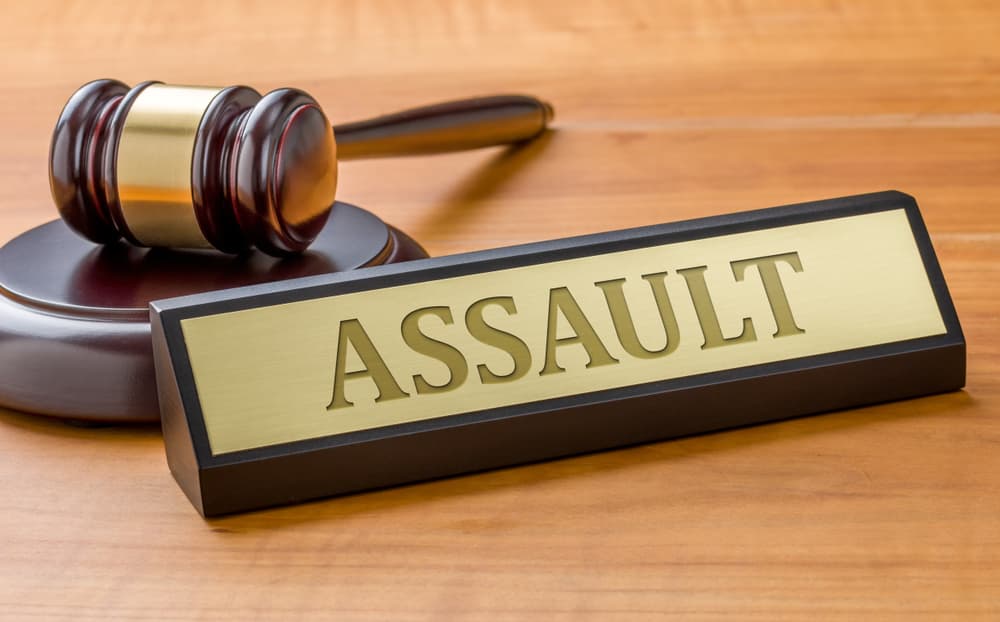Criminal assault charges are extremely serious, and the penalties upon conviction may include fines, probation, and even jail time. In addition, a convicted offender may not be permitted to contact family members, including their children. They may also be subject to various collateral consequences, including difficulty finding a job or a place to live.
If you are currently facing an assault charge, a knowledgeable criminal defense attorney in your jurisdiction can review your case circumstances, determine your legal options, and plan a defense strategy. Your attorney will aggressively advocate on your behalf and help you obtain the best possible result in your case, either by asserting legal defense at trial or negotiating a favorable plea deal with the state prosecutor.
The best way to prepare for your defense in an assault case is to hire an assault defense attorney to do so for you.
Legal Elements of an Assault Charge
For a state prosecutor to obtain a guilty finding or conviction against someone for assault, they must satisfy several elements. These elements include the following:
First, there must be an intentional act by the accused (defendant) that causes offensive contact apprehension or fear of immediate harm in the victim. This act does not necessarily have to result in physical contact; it is enough for the victim to reasonably believe they are about to be harmed.
Second, the victim’s apprehension or fear must be reasonable under the circumstances. This means that a reasonable person in the same situation would also feel threatened by the accused’s actions. The law takes into account the perceptions and reactions of ordinary people to determine whether the fear was justified.
Third, the accused must have had the apparent ability to carry out the threat of harm or offensive contact. This means they must have been capable of following through with their actions at the time they made the threat. It is not necessary for the accused to have actually had the ability to cause harm as long as it seemed like they did to the victim.
Finally, the accused must have acted with the requisite intent, which typically means acting purposefully or knowingly. This means they either intended to cause fear or harm to the victim, or they knew that their actions would likely result in fear or harm. In some cases, recklessness or negligence may suffice as the required mental state, particularly if the assault involved a disregard for the safety of others.
These elements form the foundation of an assault charge, and for a conviction to occur, the prosecution must prove each one beyond a reasonable doubt. The assault laws may vary slightly from one jurisdiction to another, but the core elements generally remain consistent.
If you are currently pending a criminal charge for assault, a criminal defense attorney in your area can determine your eligibility to raise a legal defense to the charge in court.
Potential Penalties for an Assault Conviction
Upon conviction for assault, individuals may face a range of legal penalties depending on the severity of the offense and the laws in their jurisdiction. These penalties can include fines, probation, community service, and imprisonment.
Fines are a common penalty for assault convictions. The amount of the fine can vary widely depending on factors such as the severity of the assault and the defendant’s criminal history. In some cases, fines can range from hundreds to thousands of dollars.

Probation is another possible penalty for assault convictions. Probation typically involves a period of supervision by a probation officer, during which the defendant must comply with certain conditions, such as regularly reporting to the probation officer, attending counseling or anger management classes, and refraining from further criminal activity. Violating the terms of probation can result in additional penalties, including imprisonment.
Frequently, the court orders community service as part of a sentence for assault convictions. This may involve performing unpaid work for a specified number of hours, such as cleaning up parks or roadways, working at a soup kitchen, or participating in other community service projects.
Imprisonment is the most serious penalty for assault convictions, which the court may impose for more severe cases of assault or for repeat offenders. The length of imprisonment can vary widely depending on the circumstances of the case and the laws in the jurisdiction. In some cases, individuals convicted of assault may face relatively short jail sentences, while in other cases, they may receive a sentence of many years in prison.
In addition to these penalties, individuals convicted of assault may also face other consequences, such as the loss of certain rights (e.g., the right to possess firearms), mandatory participation in counseling or treatment programs, and restitution payments to compensate the victim for any damages or injuries suffered as a result of the assault.
Assault laws and penalties vary from state to state, so the specific penalties imposed in any given case will depend upon the laws in the jurisdiction where the offense occurred. Furthermore, the defendant’s criminal history, the presence of aggravating or mitigating circumstances, and the discretion of the judge presiding over the case may influence the severity of the penalty.
How a Lawyer Can Help with Preparing Your Defense
A criminal defense attorney plays a vital role in preparing a defense in a criminal case, offering essential guidance throughout the legal process. Here is how they can help:
- Legal Experience — A defense attorney possesses a deep understanding of criminal law and procedures. They can interpret complex legal statutes and precedents, ensuring that the defendant’s rights are protected at every stage of the case.
- Investigation — Defense attorneys thoroughly investigate the circumstances surrounding the alleged crime. This may involve interviewing witnesses, examining evidence, and collaborating with experts such as forensic analysts or private investigators to uncover any information that may strengthen the defense.
- Strategy Development — Based on their analysis of the case, defense attorneys develop a strategic defense plan tailored to the specific circumstances and objectives of the defendant. They consider factors such as the strength of the prosecution’s evidence, potential legal defenses, and the defendant’s goals for the case.
- Legal Motions — Defense attorneys file legal motions to challenge the prosecution’s evidence or actions that may violate the defendant’s rights. This may include motions to suppress evidence obtained through illegal searches or seizures, motions to dismiss charges lacking sufficient evidence, or motions to exclude prejudicial information from trial.
- Negotiation — Defense attorneys negotiate with prosecutors to reach favorable plea agreements or settlements when appropriate. They advocate for reduced charges, lighter sentencing recommendations, or alternative sentencing options that may minimize the consequences for the defendant.
- Trial Representation — If the case proceeds to trial, defense attorneys provide vigorous representation in court. They present evidence, cross-examine witnesses, and deliver persuasive arguments to the judge or jury on behalf of the defendant.
- Appeals — In the event of an unfavorable outcome at trial, defense attorneys can file appeals to higher courts seeking to overturn wrongful convictions or obtain a new trial based on legal errors or misconduct that occurred during the original proceedings.
Possible Defenses to an Assault Charge
When facing a criminal assault charge, the defense attorney may use several potential defenses to challenge the accusations and protect the defendant’s rights. Some common defenses include the following:
- Self-defense — Self-defense is a fundamental legal principle that allows individuals to use reasonable force to protect themselves from imminent harm or danger. If the defendant can demonstrate that their actions were necessary to defend themselves or others from harm, they may be acquitted of the assault charge.
- Defense of Others — Similar to self-defense, defense of others allows individuals to use force to protect another person from harm if they reasonably believe that person is in imminent danger. The defendant must show that their actions were necessary and proportional to the threat posed to the other individual.
- Defense of Property — In some cases, individuals may use force to defend their property from theft or damage. However, the use of force must be reasonable and proportional to the threat the trespasser poses. Excessive force or deadly force may not be justified solely for the protection of property.
- Lack of Intent — Assault requires the intent to cause harm or fear in the victim. If the defendant can demonstrate that they did not intend to harm or threaten the victim, they may have a viable defense against the assault charge. This defense may apply in cases of accidental contact or mistaken identity.
- Consent — In certain situations, the victim may have consented to the defendant’s actions, thereby negating any claim of assault. For example, in contact sports or martial arts competitions, participants may consent to physical contact as part of the activity.
- Alibi — An alibi defense involves presenting evidence to prove that the defendant was not present at the scene of the alleged assault when it occurred. This defense relies on corroborating evidence such as witness testimony, surveillance footage, or documentation of the defendant’s whereabouts at the time of the incident.
- Mistaken Identity — If the prosecution cannot prove beyond a reasonable doubt that the defendant was the perpetrator of the assault, a mistaken identity defense may be successful. This defense relies on evidence showing that the victim misidentified the defendant or that there is insufficient evidence linking the defendant to the crime.
Each case is unique, and the effectiveness of these defenses will depend on the specific circumstances and evidence presented. A skilled criminal defense attorney can assess the case and determine the most effective defense strategy.
Reaching a Fair Plea Deal in an Assault Case
Reaching a favorable plea deal in an assault case can be crucial for the defense and is an alternative to a courtroom trial. Such a deal may entail negotiating with the prosecution to reduce the charges or lessen the potential penalties the defendant faces.

One possible aspect of a plea deal in an assault case is a reduction in charges. For example, if the defendant is originally charged with a more serious offense like aggravated assault, the plea deal may involve pleading guilty to a lesser charge, such as simple assault. This can significantly decrease the severity of the penalties the defendant may face if convicted at trial.
Another aspect of a plea deal may involve a recommendation for a lighter sentence from the prosecution. Prosecutors may agree to recommend a shorter term of imprisonment or a less severe form of punishment in exchange for the defendant’s guilty plea. This can be especially beneficial if the defendant is facing the possibility of a lengthy prison sentence if convicted at trial.
Furthermore, a plea deal may include an agreement for alternative sentencing options. Instead of imprisonment, the prosecution may offer the defendant the opportunity to participate in a diversion program, undergo counseling or treatment, or perform community service. These alternatives can provide the defendant with the chance to address any underlying issues that may have contributed to the assault and demonstrate their willingness to take responsibility for their actions.
In addition, a plea deal may involve the prosecution’s agreeing to drop certain charges altogether. For example, if the defendant is facing multiple assault charges stemming from the same incident, the prosecution may agree to dismiss some of the charges in exchange for a guilty plea to others. This can simplify the case and reduce the potential exposure to harsh penalties.
Reaching a favorable plea deal in an assault case requires careful negotiation and consideration of the potential risks and benefits. An experienced criminal defense attorney can explore the available options and pursue the best possible outcome, given the case circumstances.
Speak with an Experienced Criminal Defense Lawyer Today
If you are currently pending a criminal assault charge, an experienced criminal defense attorney can plan your defense strategy. Specifically, your lawyer can take your case to trial and raise one or more legal defenses on your behalf in pursuit of a not-guilty finding or an acquittal. Alternatively, your lawyer can negotiate a favorable plea deal with the state prosecutor on your behalf. Throughout the process, your lawyer will do everything they can to achieve the best outcome in your case.


